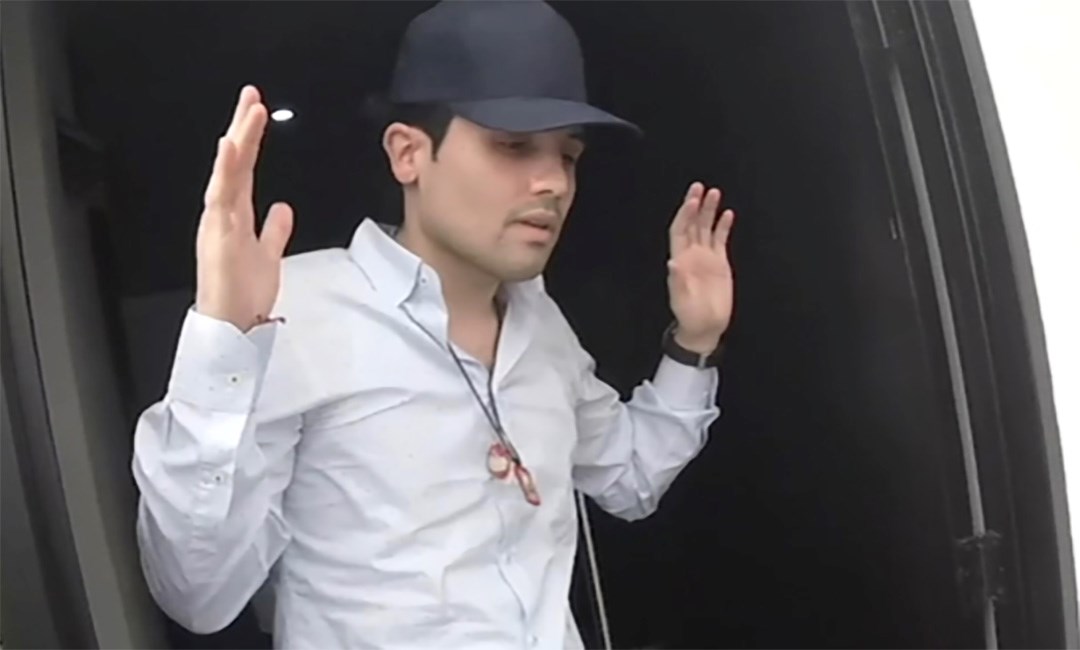News
‘El Chapo’ son, ‘Chapitos’, extradited to US on drug charges

A son of Mexican drug lord Joaquin ‘El Chapo’ Guzman, who was arrested after a bloody firefight with Mexican authorities earlier this year, has been extradited to Chicago.
He is expected to face sweeping narcotics trafficking charges.
Ovidio Guzman Lopez, 32, is reputed to have taken over the powerful Sinaloa cartel after his father’s arrest seven years ago.
He is one of four El Chapo sons, nicknamed the “Chapitos,” charged in an indictment unsealed in Chicago earlier this year.
Of the sons, Guzman Lopez, who is known as “El Raton,” or “The Mouse,” was the only one in custody.
He was captured in Culiacán, Mexico in January after an intense battle that left 10 soldiers and 19 suspects dead, according to news reports.
Guzman Lopez, who was being held in Mexico pending extradition proceedings, was flown to Chicago on Friday afternoon, according to a law enforcement source.
He could make an initial appearance at the Dirksen US Courthouse as soon as Monday.
A lawyer for Guzman Lopez was not listed on the court docket as of Friday.
Guzman Lopez was among 28 reputed members of the notorious Sinaloa cartel charged as part of a multi-jurisdictional fentanyl-trafficking investigation unveiled in April.
Attorney General Merrick Garland; U.S. Drug Enforcement Administration chief Anne Milgram; and other top federal prosecutors, including acting Chicago U.S. Attorney Morris Pasqual launched the investigation.
In outlining the charges, Garland described the violence of the Sinaloa cartel and how its members have tortured perceived enemies, including Mexican law enforcement officials.
In some cases, cartel members also have fed victims, some still alive, to tigers owned by Guzmán’s sons, Garland said.
The Chicago indictment, which was filed under seal in January, alleged Guzman Lopez assumed day-to-day control of the cartel after his father’s arrest in 2016.
The indictment accuses the sons of orchestrating the shipment of thousands of pounds of cocaine, marijuana, and other drugs into the U.S. by boat, plane, and other means.
Guzman’s other sons charged in Chicago, Jesus Alfredo Guzman Salazar, Ivan Archivaldo Guzman Salazar, and Joaquin Guzman Lopez, remained at large as of Friday.
The indictment was filed as part of the same case originally filed in Chicago in 2009 against El Chapo himself as well as many of his top henchmen, which is widely considered the largest narcotics case ever brought in Chicago.
Those charges alleged the Sinaloa cartel used jumbo jets, submarines, and tunnels to smuggle massive amounts of drugs into the U.S., much of which was later distributed in wholesale quantities in Chicago.
The cartel members then laundered billions of dollars in proceeds back to Mexico.
Among the cartel’s top distributors were Pedro and Margarito Flores, twin brothers who rose from the obscurity of the Little Village neighborhood on the West Side to working directly for El Chapo before cutting a secret cooperation deal with the government.
The twins’ decision to cooperate with federal authorities in 2008 culminated with Pedro Flores testifying against El Chapo at his trial in New York in December 2018.
El Chapo was convicted in New York in 2019 and is serving a life sentence at a maximum security federal prison in Colorado.
The indictments announced in April, meanwhile, differed significantly from previous investigations by including allegations that the cartel is now trafficking fentanyl, a synthetic narcotic 50 times more potent than heroin.
Nearly 107,000 Americans died of drug overdoses in the U.S. in 2021.
The Drug Enforcement Administration says most of the fentanyl trafficked in the United States comes from the Sinaloa cartel.
In addition to cartel leaders, the indictments also charged Chinese and Guatemalan citizens accused of supplying precursor chemicals required to make fentanyl.
Others charged in the cases include those accused of running drug labs and providing security and weapons for the drug trafficking operation, prosecutors said.
In announcing the cases, Garland said the charges “describe in detail how the Sinaloa Cartel operates — without respect for human rights, for human life, or the rule of law.”
Two of the defendants were accused of testing the potency of the cartel’s fentanyl on victims while they were tied down, Garland said.
In another instance, cartel members “experimented on a woman they had been ordered to shoot,” injecting her instead with fentanyl until she overdosed and died, he said.
In another allegation contained in the charges, after an addict died testing a batch of the cartel’s fentanyl, one of the defendants sent the batch to the United States anyway, Garland said.


